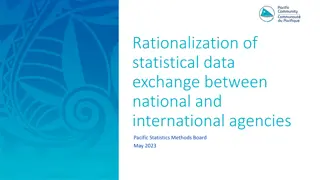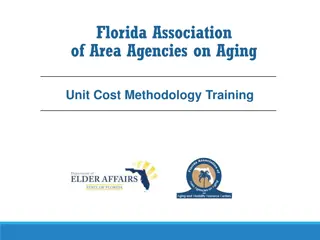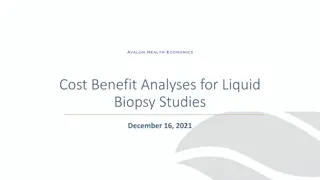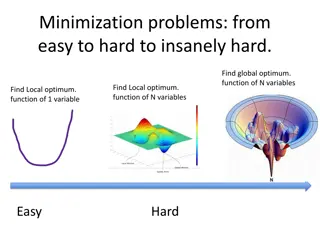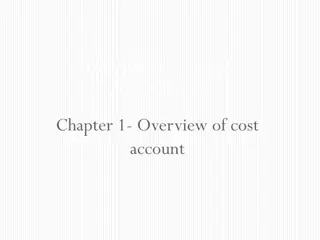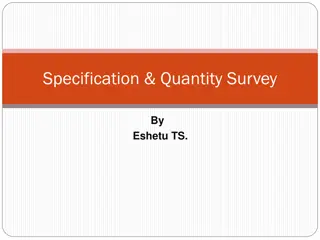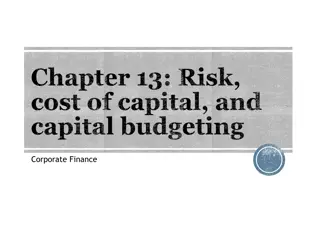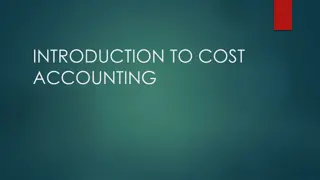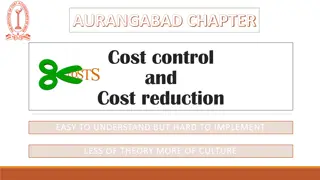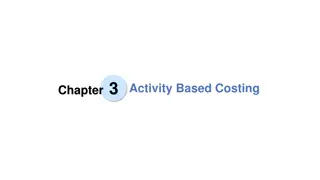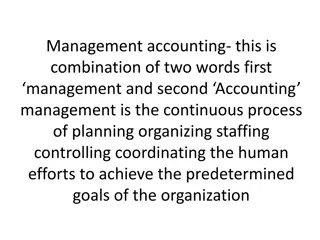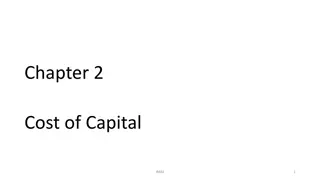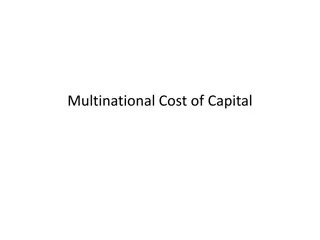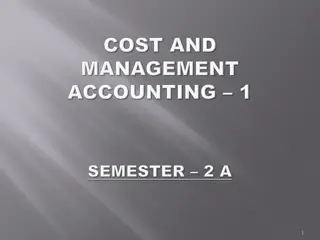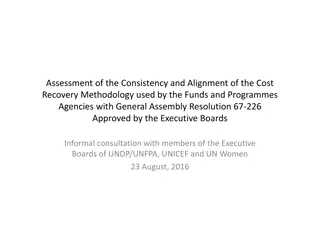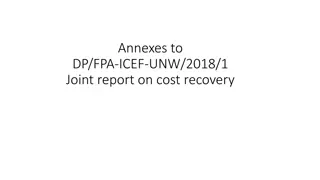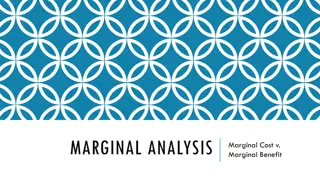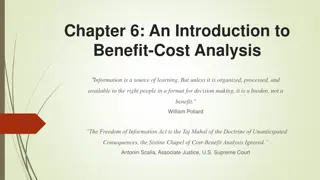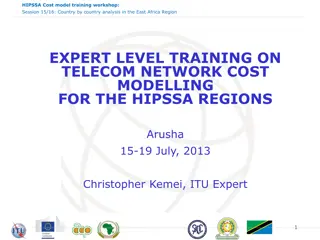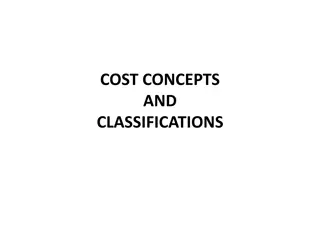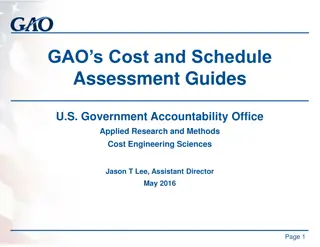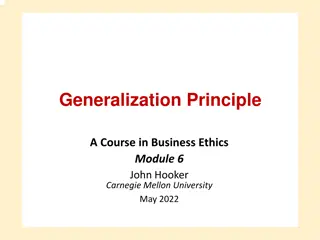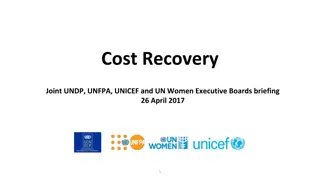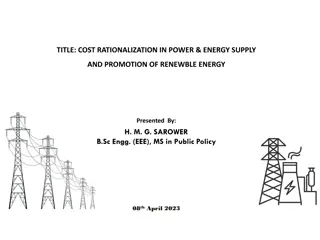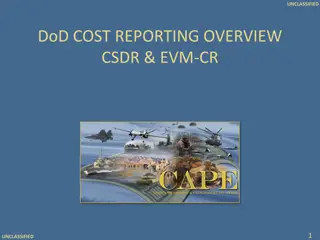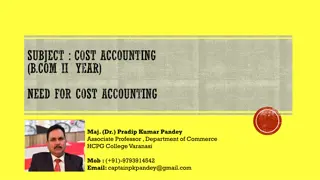Cost Of Production
Explore the concepts of production cost analysis, focusing on total fixed costs, total variable costs, total cost of production, average cost, and average fixed cost. Learn how these costs behave in the short run and their impact on a firm's operations.
0 views • 26 slides
Rationalization of statistical data exchange between national and international agencies
The discussion revolves around rationalizing statistical data exchange processes between national and international agencies, focusing on the challenges, principles, and proposed strategies to streamline reporting and dissemination. Key points include the complexity of data flows, burden of internat
1 views • 10 slides
Understanding Unit Cost Methodology Training for Area Agencies on Aging
This training provides an overview of cost allocation principles and the Unit Cost Methodology (UCM) through video sessions and practical applications using UCM spreadsheets. It covers federal regulations, the operation of UCM, and the importance of cost allocation in federally funded programs. The
2 views • 33 slides
Comprehensive Cost Management Training Objectives
This detailed training agenda outlines a comprehensive program focusing on cost management, including an overview of cost management importance, cost object definition, cost assignment, analysis, and reporting. It covers topics such as understanding cost models, cost allocations, various types of an
2 views • 41 slides
Cost-Benefit Analyses for Liquid Biopsy Studies: Understanding Health Economics and Decision Making
Health economics and decision making play a crucial role in evaluating the clinical utility and cost-effectiveness of liquid biopsies. Economic models such as cost-effectiveness analyses help in determining the incremental cost-effectiveness ratio (ICER) of interventions. Studies have shown varying
0 views • 23 slides
Optimization Techniques for Minimization Problems
Explore various minimization problems, from easy to insanely hard, and learn about finding global and local optima using approaches like bisection, Newton's method, and rationalization. Discover efficient methods such as the golden section and iterative approximation with Newton's method for optimiz
0 views • 17 slides
Discursive Construction of Legitimation: Understanding Authority and Ideology
Systems of authority aim to establish legitimacy through discourses. Legitimation involves self-orientation, justification, and the imposition of ideologies. This practice encompasses various principles and categories such as moral evaluation, rationalization, and multimodal approaches, shaping soci
1 views • 36 slides
Academic Senate Resolutions and Low-Cost Thresholds in Higher Education
The Academic Senate addresses the adoption of open educational resources (OER) and low-cost materials to support academic freedom and compliance with legislative requirements. The resolution discusses the definition of low-cost resources and the variability among California Community Colleges in set
2 views • 9 slides
Understanding Cost Accounting Essentials
This overview delves into topics such as financial accounting, classification of accounts, cost ascertainment, and management accounting. It covers the meaning of cost, methods and techniques of costing, advantages and limitations of cost accounting systems, and essentials for a robust cost accounti
4 views • 27 slides
Project Cost Estimation: Methods and Factors
Project cost estimation involves valuing all monetary aspects necessary for planning, implementing, and monitoring a project. This includes various entrants such as preliminary investigation costs, design fees, construction expenses, and more. The purpose of cost estimation is to determine work volu
1 views • 44 slides
Understanding Risk, Cost of Capital, and Capital Budgeting in Corporate Finance
Explore the concepts of risk, cost of capital, and capital budgeting in corporate finance, including the Capital Asset Pricing Model (CAPM), cost of equity, beta estimation, and cost of capital. Learn how to reduce the cost of capital and understand the impact of reducing the Weighted Average Cost o
0 views • 20 slides
Understanding Cost Accounting Fundamentals
Cost accounting involves determining the expenses incurred for producing goods or services, providing crucial information for decision-making, planning, and control. It aims to classify, record, allocate expenses accurately, presenting data for effective management guidance. Through cost classificat
0 views • 7 slides
Cost Control and Cost Reduction Strategies in Business: Understanding Implementation Challenges
Understanding the concepts of cost control and cost reduction is crucial for businesses, but implementing them can be challenging. This chapter explores the influencing factors for success in cost control and reduction, emphasizing the importance of cultural aspects, leadership, and management appro
1 views • 15 slides
Understanding Activity-Based Costing (ABC) in Cost Management
Activity-Based Costing (ABC) is a strategic costing method that allocates overhead costs to products based on activities. It offers benefits such as accurate cost allocation and identifying cost drivers but also has challenges due to increased complexity and customization. ABC differs from tradition
1 views • 15 slides
Understanding Management Accounting and Cost Accounting
Management accounting involves planning, organizing, and controlling human efforts to achieve organizational goals, while cost accounting focuses on determining the cost of products and services. The objective of cost accounting includes cost analysis, reduction, and decision-making support.
0 views • 33 slides
Progress in Nursing Colleges Re-opening and Rationalization
The briefing outlines the historical context of nursing colleges pre- and post-1994 in South Africa, focusing on efforts to re-open and rationalize these institutions. It discusses the closure and re-opening of specific colleges in provinces like Eastern Cape and Northern Cape, as well as the ration
0 views • 18 slides
Understanding the Cost of Capital in Finance
The cost of capital is crucial for businesses to determine the average cost of their finance. The Weighted Average Cost of Capital (WACC) is used as a discount rate in financial calculations. It involves estimating the cost of each source of finance and calculating a weighted average. Additionally,
0 views • 14 slides
Understanding Multinational Cost of Capital
Multinational corporations determine their cost of capital based on the cost of debt and equity. The cost of debt includes the interest rate and credit risk premium, while the cost of equity reflects the risk premium investors demand. Estimating an MNC's cost of capital involves assessing these comp
0 views • 24 slides
Understanding Cost Accounting: Techniques and Processes
Cost accounting is a specialized branch of accounting that involves the accumulation, assignment, and control of costs. It encompasses techniques like ascertainment of costs, estimation of costs, and cost control to aid in decision-making. Cost accounting plays a crucial role in budgeting, standard
2 views • 11 slides
Factors Affecting the Amount of Depreciation in Asset Valuation
Depreciation in asset valuation depends on the cost, estimated useful life, and probable salvage value. The cost of an asset includes various expenses incurred to put it in working condition. Estimated net residual value is the expected sale value of the asset at the end of its useful life after ded
2 views • 5 slides
Assessment of Cost Recovery Methodology Alignment with General Assembly Resolution 67-226
This report assesses the consistency and alignment of the cost recovery methodology used by UNDP/UNFPA, UNICEF, and UN Women with General Assembly Resolution 67-226. Issues such as declining core funding, the need to avoid cross-subsidization, and the importance of full cost recovery are highlighted
0 views • 14 slides
NBAC International Tiger Team Update 2018
The NBAC International Tiger Team, formed in late 2016, focuses on expanding the utility of the NIEM Program globally. Key initiatives include data model management, translation efforts in Canada, and engaging with international users to enhance NIEM's accessibility and usefulness. The team works on
0 views • 18 slides
Veterinary Prescription Cost Calculations
Learn how to calculate the cost of veterinary prescriptions based on total dosage, drug strength, and unit cost. Two scenarios are provided with detailed calculations for determining the total cost of the prescription. Understand how to convert units, calculate total dosage required, determine the n
0 views • 11 slides
Revisiting Davidson's Arguments on Actions, Reasons, and Causes
Over sixty years after the publication of Donald Davidson's seminal paper on Actions, Reasons, and Causes, there is ongoing debate about whether rationalization is a form of causal explanation. This article challenges Davidson's viewpoint and discusses the relation between reasons and actions, explo
0 views • 107 slides
Report on Effective Cost Recovery Rates by UNDP for 2014-2017
The joint report on cost recovery by UNDP for the years 2014-2017 provides detailed evidence and analysis of the effective average cost recovery rates, compliance with cost recovery policy, and calculations based on financial information. The report highlights contributions from various sources, inc
1 views • 23 slides
Introduction to Industrial Costing: Understanding Cost Types and Accounting Systems
Explore the fundamentals of industrial costing, including different cost types and accounting systems such as actual cost accounting, normal cost accounting, and standard cost accounting. Learn about cost data control, tasks of cost accounting, and the integration of cost type accounting in cost and
1 views • 24 slides
Understanding Marginal Analysis in Economic Decision-Making
Marginal analysis involves comparing Marginal Benefit with Marginal Cost to determine the optimal quantity for an activity. If Marginal Benefit is greater than Marginal Cost, there is a Net Marginal Benefit; if it's less, there's a Net Marginal Cost. The principle helps weigh costs and benefits befo
0 views • 14 slides
Overview of Benefit-Cost Analysis in Policy Decision Making
This chapter delves into benefit-cost analysis as an essential tool in policy evaluation. It outlines the steps involved in conducting a benefit-cost analysis, emphasizes the significance of defining and quantifying policy problems, and highlights the importance of identifying the seriousness of soc
0 views • 40 slides
Analyzing Telecom Network Cost in East Africa
This expert-level training workshop conducted in Arusha in 2013 delved into the country-by-country analysis of telecom network cost modeling in the East Africa region. The workshop covered topics such as regulatory frameworks, transparency, skills and resources, cost accounting, depreciation methods
0 views • 44 slides
Understanding Cost Concepts and Classifications for Effective Management
Explore the definition of cost, various cost classifications, elements of cost, and the preparation of cost sheets for managerial use. Delve into fixed and variable costs with examples from manufacturing jeans, highlighting the importance of managing costs in organizational operations.
1 views • 92 slides
GAO Cost and Schedule Assessment Guides: Enhancing Government Accountability
The Government Accountability Office (GAO) plays a crucial role in supporting Congress to fulfill its responsibilities by improving federal government performance and ensuring accountability. The GAO Cost Estimating and Assessment Guide outlines criteria for assessing cost estimates, and the Reliabl
0 views • 19 slides
Managing Summer Cost Share for Faculty with 9-Month Appointments
Explore the process of setting up and monitoring summer cost share for faculty with 9-month appointments. Learn why cost share for summer may not display on the FEC, how GCA establishes cost share using the Cost Share Module, and how departments should adjust the FEC to reflect summer cost share acc
0 views • 15 slides
Understanding Ethical Principles and Acting for Reasons
Ethical principles are crucial for objective decision-making, preventing rationalization. The Generalization Principle emphasizes the need for rationale in actions. The Universality of Reason asserts that rationality is independent of personal identity. Acting for Reasons theory underscores that eve
0 views • 41 slides
Joint UNDP, UNFPA, UNICEF, UN Women Executive Boards Cost Recovery Briefing
Briefing on cost recovery for the joint Executive Boards of UNDP, UNFPA, UNICEF, and UN Women, covering topics such as feedback on cost recovery, role of core resources, cost recovery models using a LEGO approach, harmonization efforts, guidance for Executive Boards, and next steps towards proposing
0 views • 42 slides
Cost Rationalization in Power & Energy Supply with Renewable Energy Promotion
Presenting the current status of the power sector in Bangladesh, focusing on factors such as installed capacity, ownership breakdown, fuel mix, capacity addition over the years, and the energy sector related to gas production. The presentation explores opportunities for cost rationalization, energy
0 views • 29 slides
Promoting Pro-competitive Reforms in Zambia
Addressing the current challenges in bus transportation and maize sector in Zambia, key findings suggest the need to enhance quality control for buses, reform fare setting processes, introduce route rationalization, and improve competition in the maize industry. By implementing policy and practice c
0 views • 14 slides
Understanding Defense Mechanisms: Psychological Strategies for Coping
Defense mechanisms are mental maneuvers used to distort the truth and protect oneself from painful emotions like shame, guilt, and anxiety. Lying, rationalization, regression, repression, denial, suppression, and projection are common defense mechanisms explored in this content.
0 views • 15 slides
Defense Mechanisms in Psychology: Understanding Repression, Displacement, Intellectualization, Rationalization
Defense mechanisms play a crucial role in how individuals cope with stress and anxiety. This text delves into key defense mechanisms such as repression, displacement, intellectualization, and rationalization. These mechanisms help individuals manage unacceptable thoughts, feelings, and impulses by r
0 views • 11 slides
Defense Cost Reporting and Systems Overview
Defense Cost Analysis and Reporting Systems (CSDR) provide the cost community with essential data for developing independent cost estimates within major defense acquisition programs. The Defense Automated Cost Information Management System (DACIMS) offers instant access to historical cost informatio
0 views • 19 slides
Importance of Cost Accounting in Business Management
Cost accounting plays a crucial role in modern business environments where cost effectiveness and quality consciousness are vital for success. This branch of accounting helps in planning, controlling, and determining the costs of products or services, providing essential data for efficient managemen
0 views • 6 slides

